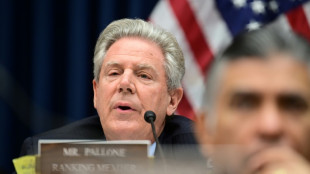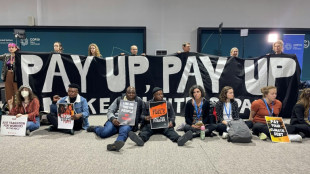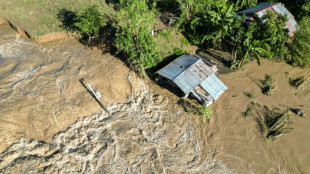
-
 Macron tells Xi he shares desire for 'durable peace' in Ukraine
Macron tells Xi he shares desire for 'durable peace' in Ukraine
-
Ruthless Japan beat China to move to brink of World Cup qualification

-
 French farmers threaten 'chaos' over proposed EU-Mercosur deal
French farmers threaten 'chaos' over proposed EU-Mercosur deal
-
Brazil arrests G20 guards over alleged 2022 Lula assassination plot

-
 China's Xi urges 'strategic' ties in talks with Germany's Scholz
China's Xi urges 'strategic' ties in talks with Germany's Scholz
-
Raducanu gives Britain lead on Slovakia in BJK Cup semis

-
 Russia says Ukraine fired first US-long range missiles
Russia says Ukraine fired first US-long range missiles
-
COP29 negotiators strive for deal after G20 'marching orders'

-
 Walmart lifts full-year forecast after strong Q3
Walmart lifts full-year forecast after strong Q3
-
British farmers protest in London over inheritance tax change

-
 NATO holds large Arctic exercises in Russia's backyard
NATO holds large Arctic exercises in Russia's backyard
-
Trouble brews in India's Manipur state

-
 Son of Norwegian princess arrested on suspicion of rape
Son of Norwegian princess arrested on suspicion of rape
-
Romanian court says 'irregularities' in influencer Andrew Tate's indictment

-
 Iran faces fresh censure over lack of cooperation at UN nuclear meeting
Iran faces fresh censure over lack of cooperation at UN nuclear meeting
-
Despondency and defiance as 45 Hong Kong campaigners jailed

-
 Scholar, lawmakers and journalist among Hong Kongers jailed
Scholar, lawmakers and journalist among Hong Kongers jailed
-
European stocks slide on fears of Russia-Ukraine escalation

-
 Police break up Georgia vote protest as president mounts court challenge
Police break up Georgia vote protest as president mounts court challenge
-
Spain royals visit flood epicentre after chaotic trip

-
 France's Gisele Pelicot says 'macho' society must change attitude on rape
France's Gisele Pelicot says 'macho' society must change attitude on rape
-
G20 leaders talk climate, wars -- and brace for Trump's return

-
 US lawmaker accuses Azerbaijan in near 'assault' at COP29
US lawmaker accuses Azerbaijan in near 'assault' at COP29
-
Tuchel's England have 'tools' to win World Cup, says Carsley

-
 Federer hails 'historic' Nadal ahead of imminent retirement
Federer hails 'historic' Nadal ahead of imminent retirement
-
Ukraine vows no surrender, Kremlin issues nuke threat on 1,000th day of war

-
 Novo Nordisk's obesity drug Wegovy goes on sale in China
Novo Nordisk's obesity drug Wegovy goes on sale in China
-
Spain royals to visit flood epicentre after chaotic trip: media

-
 French farmers step up protests against EU-Mercosur deal
French farmers step up protests against EU-Mercosur deal
-
Rose says Europe Ryder Cup stars play 'for the badge' not money

-
 Negotiators seek to break COP29 impasse after G20 'marching orders'
Negotiators seek to break COP29 impasse after G20 'marching orders'
-
Burst dike leaves Filipino farmers under water

-
 Markets rally after US bounce as Nvidia comes into focus
Markets rally after US bounce as Nvidia comes into focus
-
Crisis-hit Thyssenkrupp books another hefty annual loss

-
 US envoy in Lebanon for talks on halting Israel-Hezbollah war
US envoy in Lebanon for talks on halting Israel-Hezbollah war
-
India to send 5,000 extra troops to quell Manipur unrest

-
 Sex, drugs and gritty reality on Prague's underworld tours
Sex, drugs and gritty reality on Prague's underworld tours
-
Farmers descend on London to overturn inheritance tax change

-
 Clippers upset Warriors, Lillard saves Bucks
Clippers upset Warriors, Lillard saves Bucks
-
Acquitted 'Hong Kong 47' defendant sees freedom as responsibility

-
 Floods strike thousands of houses in northern Philippines
Floods strike thousands of houses in northern Philippines
-
Illegal farm fires fuel Indian capital's smog misery

-
 SpaceX set for Starship's next flight, Trump expected to attend
SpaceX set for Starship's next flight, Trump expected to attend
-
Texans cruise as Cowboys crisis deepens

-
 Do the Donald! Trump dance takes US sport by storm
Do the Donald! Trump dance takes US sport by storm
-
Home hero Cameron Smith desperate for first win of 2024 at Australian PGA

-
 Team Trump assails Biden decision on missiles for Ukraine
Team Trump assails Biden decision on missiles for Ukraine
-
Hong Kong court jails 45 democracy campaigners on subversion charges

-
 Several children injured in car crash at central China school
Several children injured in car crash at central China school
-
Urban mosquito sparks malaria surge in East Africa


Ukraine could lose half its harvest due to war: minister
Bombed out wheat fields, farmers gone to the front, supplies chains ruined.
Half of Ukraine's harvest this year, crucial to global food supplies, could be lost because of Russia's war, the country's agriculture minister warned in an interview with AFP.
Last year Ukraine, known as the breadbasket of Europe, harvested a record 106 million tonnes of grain, but this year, the figure could drop 25 or even 50 percent, Mykola Solsky said in written remarks to AFP on Wednesday.
"And it's still an optimistic forecast," Solsky said.
Famous for its fertile black soil, Ukraine was the world's fourth largest exporter of corn and on track to become the third largest exporter of wheat.
Russia's war has been catastrophic for its agriculture and economy.
Several regions, especially the fertile Kherson, Zaporizhzhia and Odessa in the south, are either seeing intense fighting or are inaccessible for farming.
While Solsky vowed that "Ukrainian farmers will sow everywhere where it's possible", he estimated that they can only access 50-75 percent of Ukraine's cropland this season, which could lead to food shortages around the world.
"Because of this war, there can be hunger in a number of countries," Solsky said.
- Farmers off to the front -
With many farmers joining the army or volunteer territorial defence units, farms are scrambling to find manpower.
"We have a shortage of workers," Solsky said.
His ministry is now trying to put in place a system of temporary military exemptions for agriculture workers, Solsky added.
Despite the war, Ukrainian farmers have already started sowing wheat, barley, rapeseed, oats, sunflowers and soybeans, but the changing military situation is forcing them to improvise.
Farmers will plant crops based on availability of seeds, fertilisers, pesticides and fuel.
"Each farmer and each farm will now have to decide for themselves," Solsky said.
- 'Cynically striking our fuel depots' -
Fuel shortage is another major concern. Before the war, Ukraine received most of its fuel from Russia and Moscow's ally Belarus, and those supplies are now off limits. Meanwhile, sea ports, another source of fuel deliveries, are blocked by Russian forces.
The situation deteriorated further in recent weeks, with Russian strikes destroying several large fuel depots, particularly in the west of the country, which until then had been relatively spared.
"The enemy is cynically striking our fuel depots, knowing that we are getting ready for the sowing season to prevent us from going through with it," Solsky said.
Ukraine has enough reserves to feed its own population, which before the war amounted to about 40 million people. To do that it has banned or limited exports of wheat, sugar, buckwheat, barley and oats as well as beef and poultry.
But agricultural exports are crucial both for the country's economy and for global food supplies.
On Tuesday, Russia was accused before the UN Security Council of creating a global food crisis with its war, which could have especially dire consequences for North Africa and the Middle East.
Before the war, Ukraine exported 4.5 million tonnes of agricultural products each month from its ports, but Russia's blockade "has essentially stopped our exports", Solsky said.
"The Russians are bombing our ports and have mined sea routes," he said. "Restoring them, after we win, will take several years."
The government is looking for ways to increase railways exports, Solsky added.
H.Romero--AT
